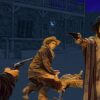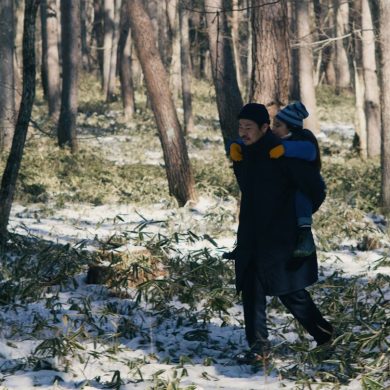Lucy (Adele Perovic) heads to the forest to seek refuge in isolation from a man who won’t leave her alone. Her sister, Cassie (Eloise Mignon), periodically checks in on her over the phone, providing Lucy with updates as to where this unseen man is, and constantly reminding her to not turn on her phone for fear of being tracked. In the meantime, Lucy may not be alone in her remote refuge as other worldly beings begin to make their presence known.
Director and co-writer Donna McRae’s Lost Gully Road is a film that is of the moment. Created as a response after the terrible loss of lives of women in Melbourne, the themes aren’t immediately obvious. Instead, there is a deliberate, slow creep that slinks over the film, gradually unveiling a tense, extremely real story. Albeit, one that is a ghost story.
The brilliance of genre films like Lost Gully Road, is that themes that may be neglected in more mainstream genres, such as violence against women, can be explored through a different lens – one that amplifies the intricacies of its very real themes through the eyes of the the unnatural. While Lost Gully Road is predominantly a supernatural film, it does utilise the notion the unseen to create a truly terrifying glimpse at masculinity and the toxic tendrils that it has weaved into the world.
Lucy is looking to escape a man – the fact we never learn what it is he did to Lucy, or who he is in relation to her, adds to the tension as our mind is left to conjure up all manner of frightening things that have unfortunately befallen many women around the world. Even in the forest (the beautiful Dandenongs), toxic masculinity rears its ugly head. A local shopkeeper (John Brumpton) Lucy interacts with is suitably skeevy, making inappropriate comments that he would feel would surely be harmless.
Cinematographer László Baranyai brings the same level of eerie, unsettling awareness of the Australian forest as he did with Downriver. As Lucy walks through the forest in her Red Riding Hood-esque jacket, you can feel her mind ticking over, rolling unseen events around like a ball between two fingertips. Yet, as she walks and thinks, the looming trees hang over her like phallic remnants. Hovering throughout these beacons of masculinity are small, stunning red birds – flitting in the green, existing just out of reach of the trees. Baranyani has an acute understanding of the Australian environment, and it’s one that reminds why he is an asset to Australian cinema.
There is one fascinating scene that is a textbook explanation of the difference of the male gaze and the female gaze. The reframing of bathing as a non-sexual task has been a gradual one throughout modern cinema, and one that is driven mostly by women directors. As Lucy is showering, we see her wash herself from the perspective of the camera, or rather, the director. It’s unexciting, the display of a task that needs competing rather than anything titillating. Then, the perspective moves to that of a voyeur, leering at Lucy, watching her bathe herself and, in turn, getting pleasure from it. It’s unsettling, creepy and feels like it wouldn’t have been out of place in a Porky’s film.
Impressing greatly is Adele Perovic, who carries the film almost single handed. Balancing fear, anxiety, boredom, and uncertainty can’t be an easy task, but Perovic handles it with ease. A scene where she celebrates her birthday alone is particularly touching. The third act moments are equally impressive, with Perovic giving herself completely to the physical necessities of the story.
Donna McRae brings a sense of awareness and respect to a serious subject. Working on an almost non-existent budget, McRae draws a deep story using limited tools. The looming absence of people adds to the sense that, no matter where women go, they are never truly safe. The final shot, and the understanding of the preceding story on top what looms after the shot ceases, is truly unsettling.
Unfortunately, less effective is the score by Dave Graney and Clare Moore. While the key motif carries nicely through the film, there are a few too many moments early on that feel like the score is tipping its hand a little too much. This is a minor quibble in an otherwise stellar film.
If this is what can be achieved on a micro-budget, then one can only hope that Donna McRae is able to secure a bigger budget for her next film, as no doubt she would weave even greater wonders.
Director: Donna McRae
Cast: Adele Perovic, John Brumpton, Jane Clifton
Writers: Donna McRae, Michael Vale




